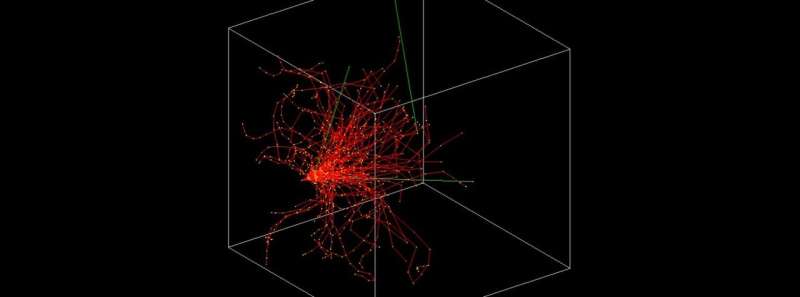
Visualization of the paths of rays emerging from a pencil beam with a small beam angle. Credit: European Physical Journal Plus (2024) DOI: 10.1140/epjp/s13360-024-05519-y
Researchers have identified specific materials, including certain plastics, rubber, and synthetic fibers, as well as Martian soil (regolith) that effectively protect astronauts by blocking harmful space radiation on Mars. These findings could inform the design of protective habitats and space suits, making long-duration Mars missions more feasible. Because Mars lacks Earth’s thick atmosphere and magnetic field, astronauts exploring the planet are exposed to dangerous levels of radiation.
Dimitra Adri, researcher at the Center for Astrophysics and Space Sciences and team leader of the Mars Research Group at NYU Abu Dhabi’s Center for Astrophysics and Space Sciences, and lead author Dionysios Kakis of the University of Patras in Greece report this. New discoveries „Modeling the Performance of Radiation Shielding Materials for the Protection of Astronauts on Mars,” appears in the journal. European Physical Journal Plus.
Through computer modeling to simulate radiation conditions on Mars, the researchers tested a variety of standard and innovative materials to determine which best shielded cosmic radiation and some composite materials such as plastic, rubber, and synthetic fibers that all performed best. Martian soil (regolith) was somewhat effective and could be used as an additional protective layer.
Additionally, they demonstrated that the more widely used aluminum can be helpful when combined with other low atomic number materials. The study also used real Mars data from NASA’s Curiosity rover to confirm these findings.
„This advance improves astronaut safety and makes long-duration Mars missions a more realistic possibility,” Adri said. It supports the future of human space exploration and the creation of human bases on Mars, including the UAE’s Mars 2117 program and its goal of establishing a city on Mars by 2117.”
„Many of the materials were specifically tested in a simulated Martian environment, and our results are directly applicable to future missions and improve the combination of advanced materials with natural resources available on Mars,” Kakis added.
More information:
Dionysios Gakis et al., Modeling the Performance of Radiation Shielding Materials for the Protection of Astronauts on Mars, European Physical Journal Plus (2024) DOI: 10.1140/epjp/s13360-024-05519-y
Quotation: Researchers identify effective material to protect astronauts from harmful cosmic radiation on Mars (2024, Aug 23)
This document is subject to copyright. No part may be reproduced without written permission except for any reasonable manipulation for the purpose of personal study or research. Content is provided for informational purposes only.

„Oddany rozwiązywacz problemów. Przyjazny hipsterom praktykant bekonu. Miłośnik kawy. Nieuleczalny introwertyk. Student.
